If you are planning to get a dog, it’s important to prepare for the arrival of a new family member. This includes not only equipping a place for the dog, purchasing a collar and toys but also carefully considering how to feed the dog. This is especially true in the case of a German Shepherd puppy.
It is necessary not only to study all the features of “Germans,” such as the nuances of puppy care and feeding, but also to be organized and strictly adhere to the chosen policy; otherwise, you will have a spoiled dog. If you want your little friend to grow strong and healthy, help you; our article tells you in detail, with photos and video, how to feed a German Shepherd puppy correctly.
German Shepherd Puppies Feeding at one month of age: the hard work has begun.
Nowadays, you can find pet food prepared in almost all localities. These mixtures are divided into several classes, and the higher the quality of the food, the higher the cost. We suggest you go the “old-fashioned” way: feed your dog only natural food. This is meat and porridge. This method can be called more acceptable if the food is varied and the baby receives all the necessary microelements for health. It would be best if you remembered the only rule: cheap products can not be good and valuable.
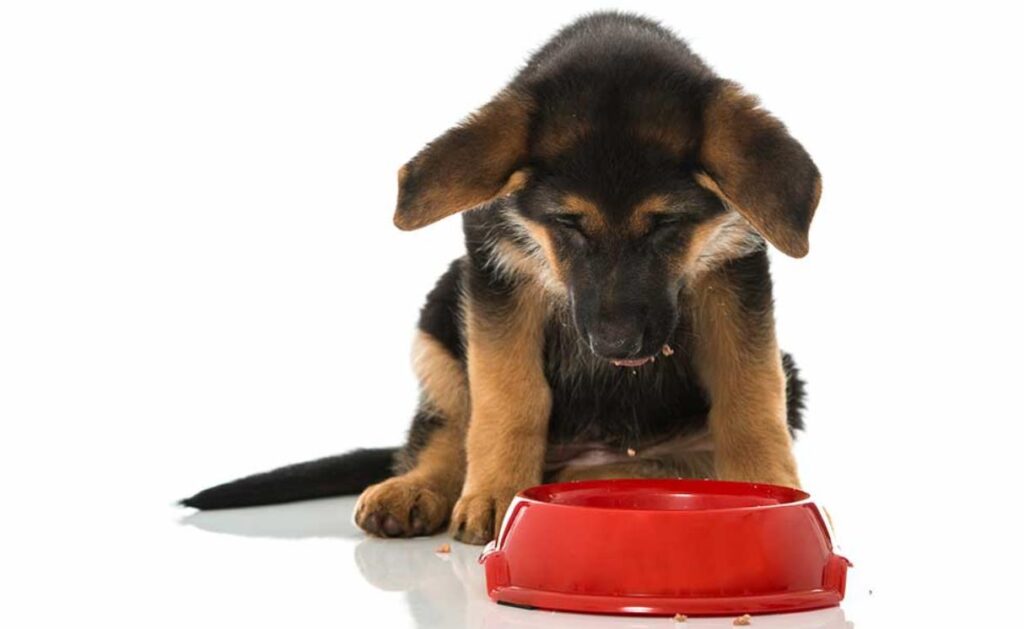
Owners introduce food before you even pick up your puppy from its home. Ask the owners what they give to the babies, and then you’ll know roughly what quality your future guardian will have.
Typically, the diet of a German Shepherd puppy under one month of age includes:
- Raw minced meat or finely chopped meat
- Dairy products
- Fine porridge
So, the puppy should be able to eat everything and nothing else: willingly accept the food offered.
Our goal is to get a beautiful, powerful, and working dog. Statistically, by the age of two, the weight of German Shepherds is distributed as follows:
- Males – 32-40 kg
- Bitches – 22-32 kg
Of course, these figures are very average, and some specimens reach much higher weights—not because of fat, but because of genetic characteristics.
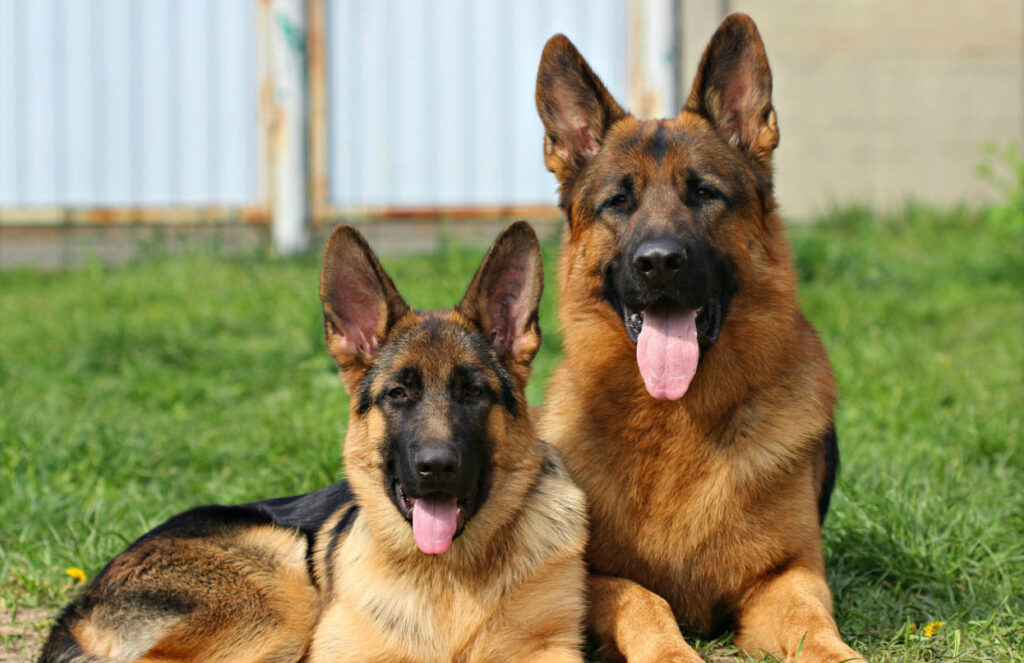
So, how do you feed a German Shepherd puppy at one month? First, you should pay attention to the fact that at this age, the growth rate of Germans is simply enormous, all because of the increased metabolism. However, the size of the stomach is relatively small. Therefore, in the first month, feed the little one better high-calorie food, which is quickly digested. In this case, the portions should correspond to the size of the stomach, that is, be small. The total volume of food eaten should be about one glass.
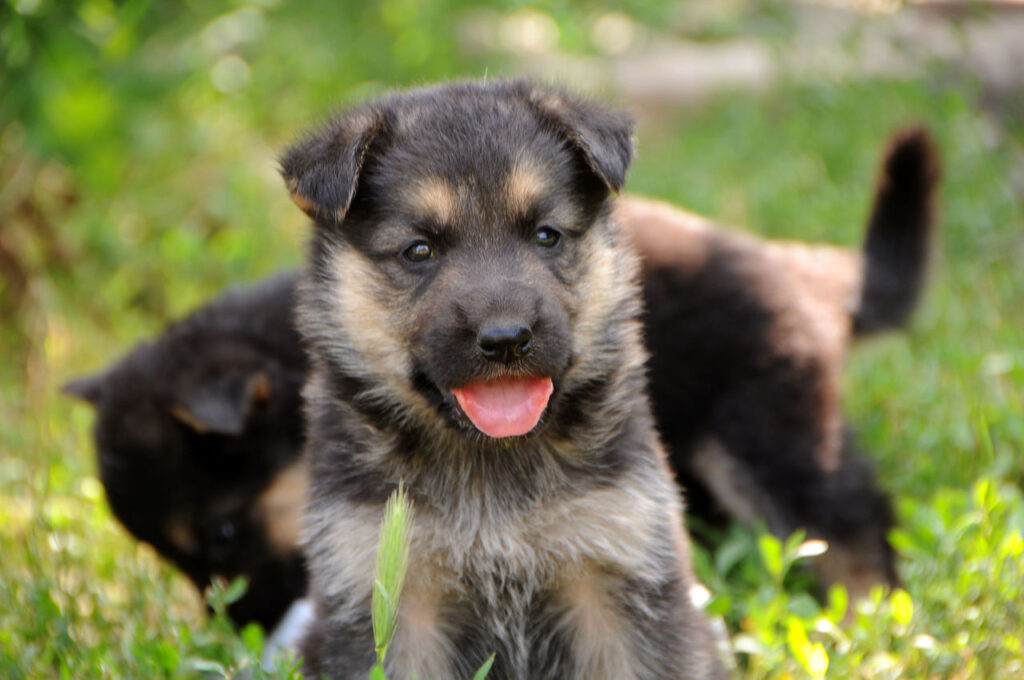
The diet for a one-month-old German Shepherd puppy should include these foods:
- Meat. Both raw and cooked. And it should be beef. Raw meat is either scraped off or cut into small pieces and given to the puppy at feeding time “for dessert.” It is raw meat that stimulates growth and normal development of the body. But minced meat should not be given. The puppy should learn to chew the fibers himself. Boiled meat can be given together with porridge cooked in the same broth.
- Milk. This includes milk in liquid form and porridge cooked in it. Rice and oatmeal are also perfectly suitable. All these should be healthy ground. Cottage cheese mixed with raw egg yolk or kefir is also necessary.

By the way, about micronutrients. All owners will not need to learn about such a disease as rickets. The disease violates nutritional norms, specifically with a lack of calcium elements. The initial stage of rickets manifests itself in the puppy’s nervous system. He becomes overly fearful, hides from light, and reacts painfully to sudden sounds.
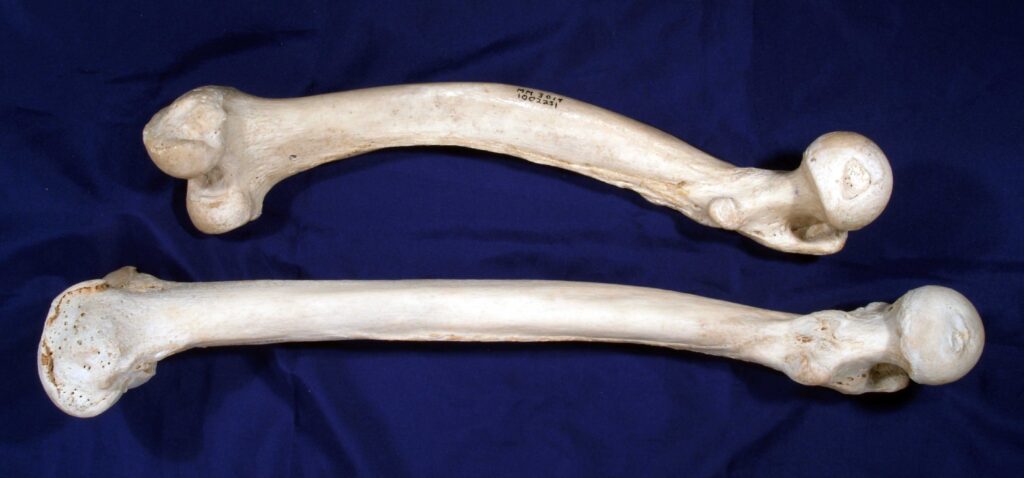
Subsequently, there are changes in the bone structure. Sagging backs and crooked paws – this is all rickets. The bones of the entire skeleton are deformed. Cartilage tissue is transformed into bone tissue at this time, which happens when microelements are washed out.
And when there is a lack of sunlight, characteristic “bracelets” appear on the joints, and “rosaries” appear on the ribs. These defects cannot be corrected.
Nutrition must be given the utmost attention in the first year of life. The slightest deviation from the ideal diet can provoke, for example, the appearance of many defects, after which the dog cannot be classified as a pedigree.

To avoid all this, be responsible: feed your puppy a nutritious diet and take him for frequent walks. I’d like you to approach feeding a one-month-old German Shepherd puppy from the perspective of a professional breeder, and you’ll be fine.
Nutrition of a German Shepherd puppy at 2-3 months of age
From the age of two months, the diet of a German Shepherd puppy should include vegetable fiber. The simplest option is to add boiled and grated carrots to porridge. Beneficial and necessary will be the intervention of unrefined vegetable oil. Better pharmacy pumpkin, but you can also sunflower. The dose is a teaspoon a day.
In summer, you can feed any seasonal fruits and vegetables.
At this time, many breeders offer the puppy a sugar bone. By about 3 to 3.5 months, the baby’s milk teeth will fall out, and the permanent teeth will come in. The ages may vary, but your puppy will chew on anything that comes his way. Therefore, the brain bone option looks very tempting. You can boil the bone to make the pungent odor less uncomfortable.
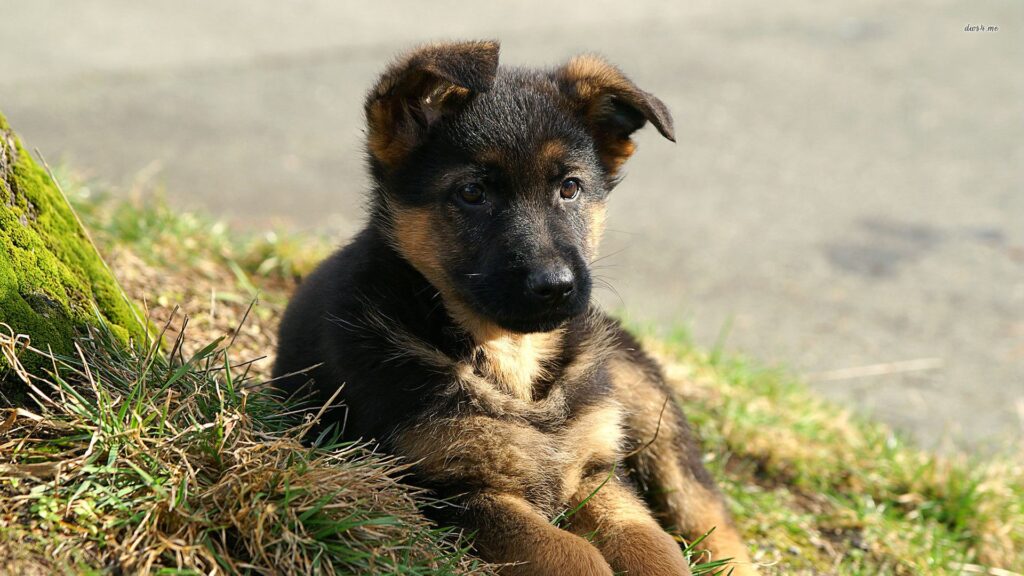
In principle, how to feed a sheepdog puppy at two months of age is apparent. Meals can be reduced to four times. And the daily volume of food eaten should be like the content of one and a half glasses.
Before proceeding to the next point, what do you think about feeding a two-month-old German Shepherd puppy we have figured out?
Feeding a German Shepherd puppy at four months of age
A German puppy at four months of age is already quite a grown-up person. It is at this age that breeders review their charges for their diet. What does a German Shepherd puppy eat at this age?

Firstly, the animal continues to change teeth and, at the same time, becomes ears. Increasing the dose of calcium and collagen; otherwise, the ears may not stand up properly. This goodness is enough in broths from hooves, chicken feet, wings, heads, and tails. You can also buy various preparations in the pharmacy, including suitable and ordinary gelatin. A spoonful of the product is soaked and added to the porridge.
At this time, the diet of the German Shepherd puppy does not change much. Let your pet continue to chew on the bone, and he can be given complex vitamins with potassium. But the volume of food should slightly increase. This is about two glasses of food.
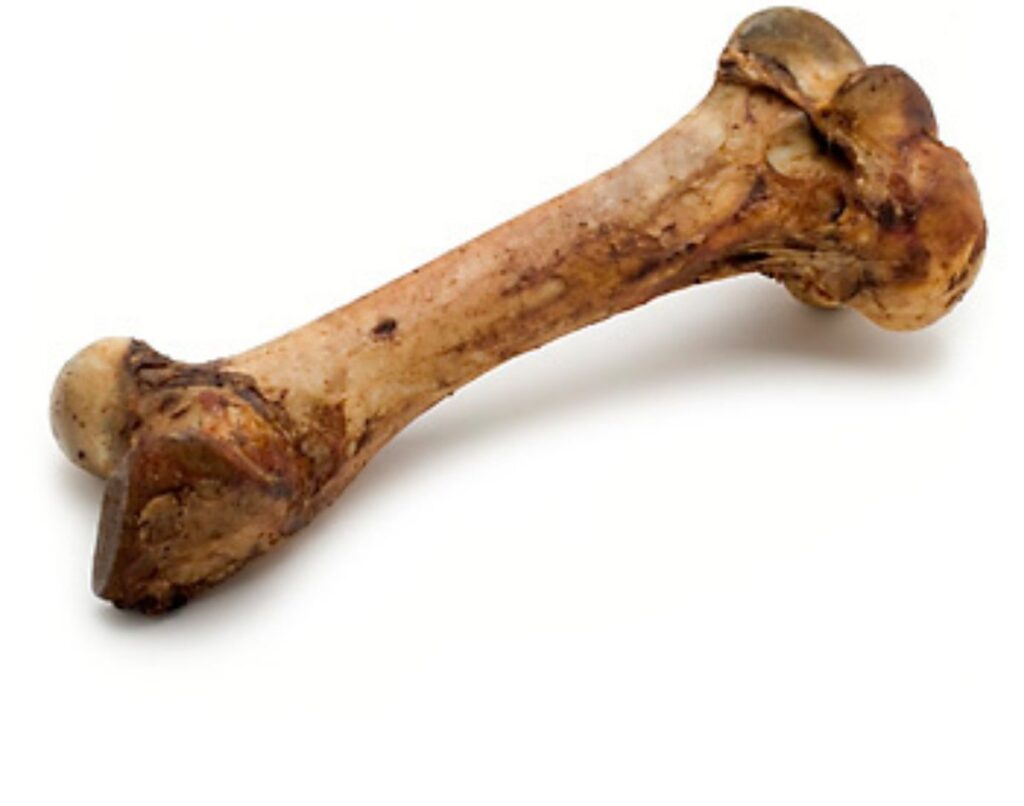
And by the way, do you know why some Germans have bright red undercoats, and others have light straws?
During puppyhood, the coat color begins to form. To make it brighter, include the following in the diet of a German Shepherd puppy:
- Raw grated carrots
- Turmeric
- Seaweed
- Beets

Feeding a German Shepherd puppy at five months of age
At this age, the diet of a German Shepherd puppy needs a slight change. By-products are introduced into the diet:
- liver
- lungs
- udder
- brains
- hearts
- stomachs
- spleen
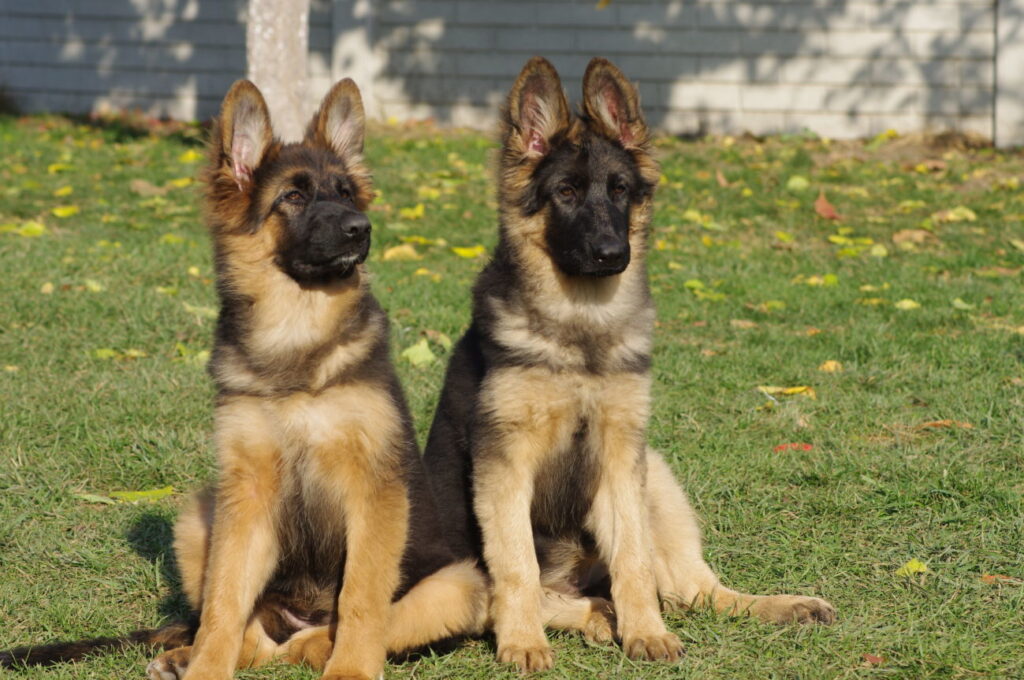
The weight of food eaten at one time can reach 400 grams. Curd is gradually excluded from the menu, and male dogs are not given milk.
New types of food are introduced for the puppy:
- Porridge: wheat, buckwheat
- Poultry meat: raw and cooked
- Eggs: boiled
Remember, the best food for German Shepherd puppies is a thoughtful mix of vegetables, meats, oils, and vitamins.
Feeding a German Shepherd puppy up to one year old
The young dog’s diet does not change much at this time. After six months of age, the puppy eats the same food as before, only the portion sizes increase. The bone can be removed as the dog has developed strong teeth with which he can chew it. If fragments get into the esophagus, they can cause a perforation, so it is best not to take any chances.

The diet of a German Shepherd dog up to a year old is already similar to that of an adult dog.
How to feed a German Shepherd puppy after one year of age
After a year, your cute puppy will develop into an adult, albeit very young, German Shepherd.

The ratio of foods in the diet:
- Meat – 30-50%
- Porridge – 25-35%
- Vegetables – 5-20%
Fresh vegetables are preferable to boil; if you give raw meat, regularly carry out deworming as a treat, and use suitable croutons and fruit. Tubular and sugar bones do not give at all; from them, no benefit but a constant threat. In addition, bones can provoke constipation. Providing as little as possible is desirable for fish, especially river fish, as it has almost nothing beneficial for your friend.
Feeding a German Shepherd puppy after a year of natural food will take a lot of time, money, and effort, but all these troubles will pale before you realize that you now have the most genuine friend together!
And a little bit about dog products
To keep your pet healthy, beautiful, and well-behaved, you must balance his diet so that his growing body gets everything it needs. It’s no secret that a dog is a predator, although to a lesser extent than a cat. Therefore, a dog’s primary energy source and everything else is protein. Only then come fats, carbohydrates, minerals, fiber, and vitamins.
Squirrels for a puppy
The primary source is animal products, such as meat. Meat can be given raw or cooked. However, your puppy will prefer raw meat, which provides everything it needs.
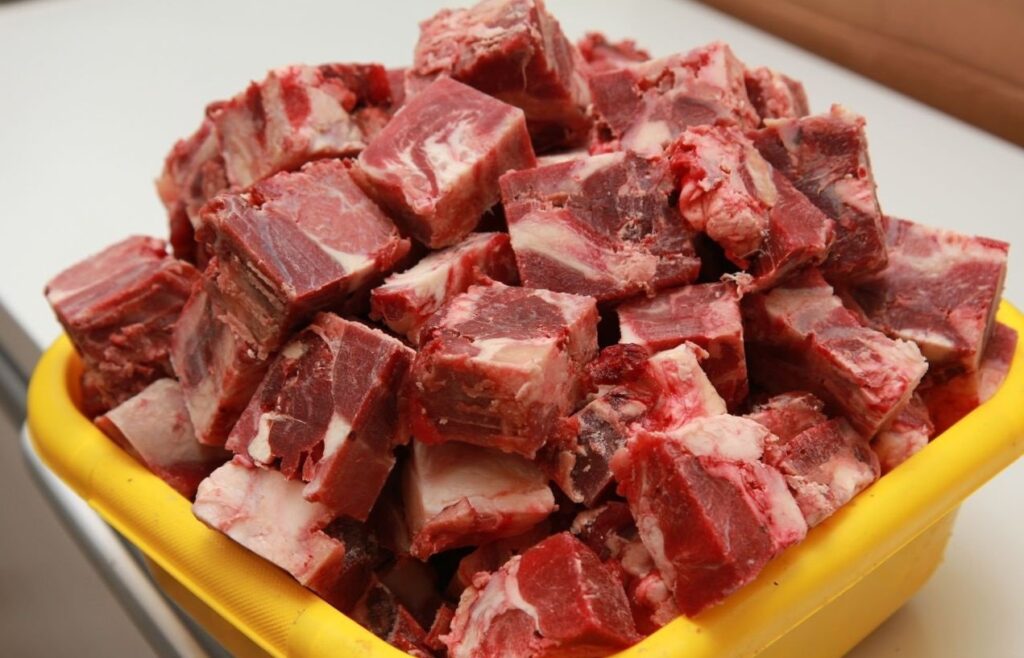
About sugar bones: A baby will enjoy scratching his gums, but bones already carry a danger at an older age—they can traumatize the intestines and stomach.
You can give your dog fish a few times a week, but only raw or cooked seafood without bones. Fish products leach vitamin B, resulting in intestinal disorders, stunted growth, dandruff, and a weakened nominal system. Finally, fish accumulate heavy metals, which can cause banal poisoning.
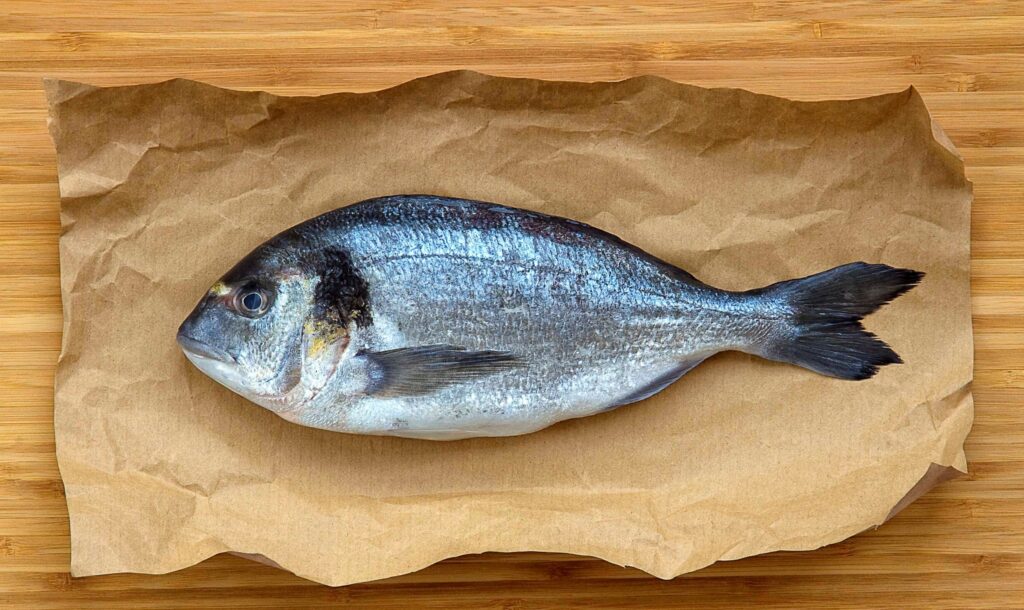
While cottage cheese is an excellent source of protein, raw eggs need to be better digested. Moreover, raw protein can provoke dermatitis. Therefore, if and eggs – then boiled or in the form of an omelet. Milk, kefir, sour milk, etc., can and should be given. It is offered either in raw form or cooked milk porridge.
Fats for the dog
This is also an essential element. The German Shepherd needs animal, vegetable, and milk fats. A smooth, glossy coat indicates that the animal has enough of everything.
Your baby needs 2.6 grams of fat per 1 kg of weight per day. Add animal fats to soups and porridge. Sometimes, it can be replaced with butter. The dose for a puppy up to 3 months old will be 10-15 g; for a half-year-old, it will be 20-25 g daily.
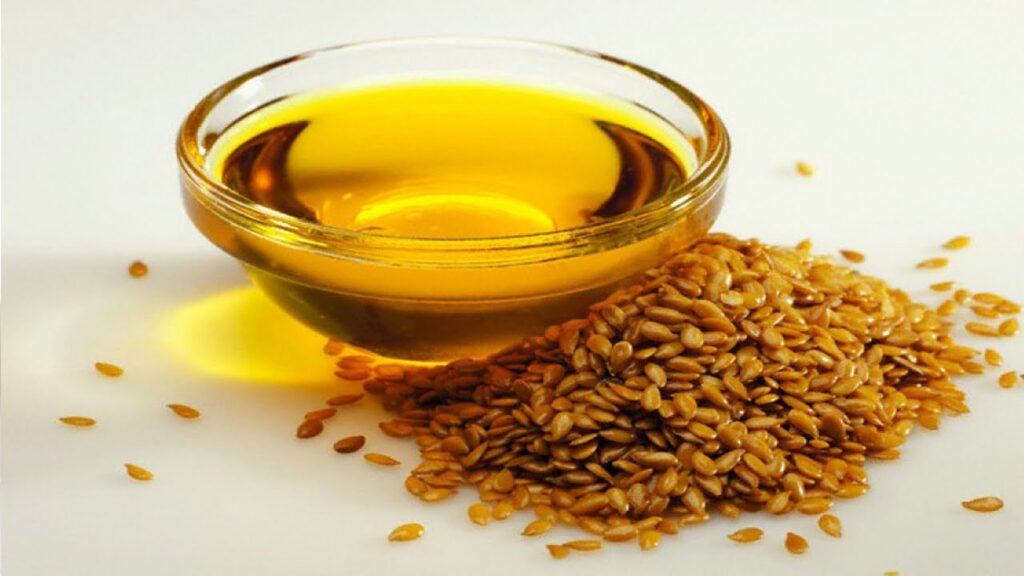
Vegetable fats contain valuable unsaturated acids. They increase the puppy’s resistance to various diseases, stimulate rapid growth, normalize metabolism, and positively affect the circulatory system.
Carbohydrates
This is an essential component that gives energy and stimulates the gastrointestinal tract. These are starch, sugar, fiber, and simply – cereals, fruits and vegetables. And if the dog’s diet lacks fats, carbohydrates increase proportionally. Manka is given under supervision because it makes the puppy gain weight very quickly and becomes loose. And overfeeding with Hercules can cause inflammation of the anal glands.
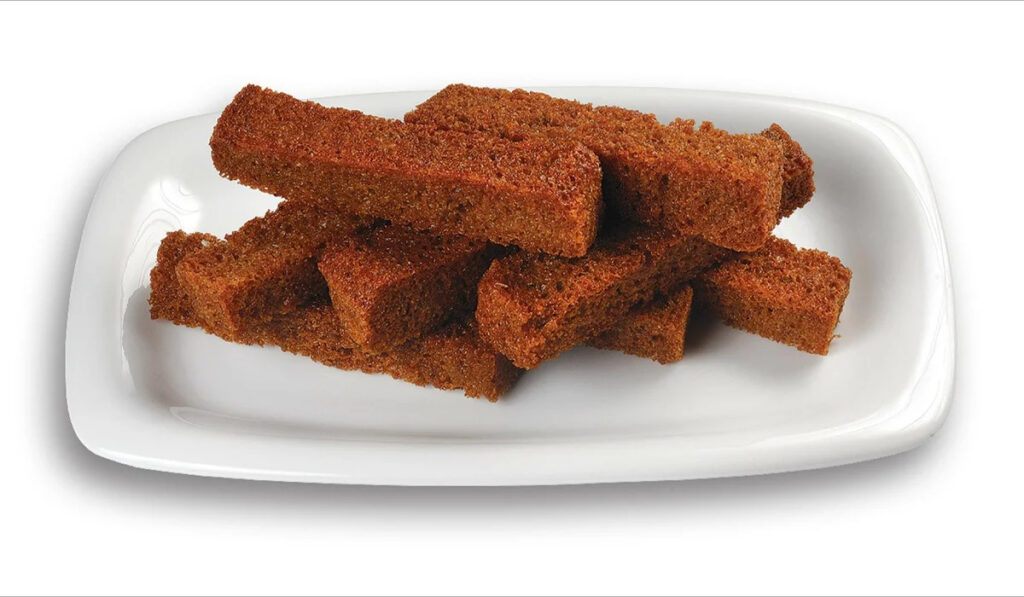
Fresh bread should not be given to any dog. It will clump together in the stomach into a sticky lump, inhibiting digestion. Instead, treat your dog to breadcrumbs in moderation, starting at two months of age.
Sprouted grains are beneficial; giving your dog one tablespoon a day will be convenient. If necessary, you can also make vitamin flour by sprouting the grains, drying them, and grinding them.
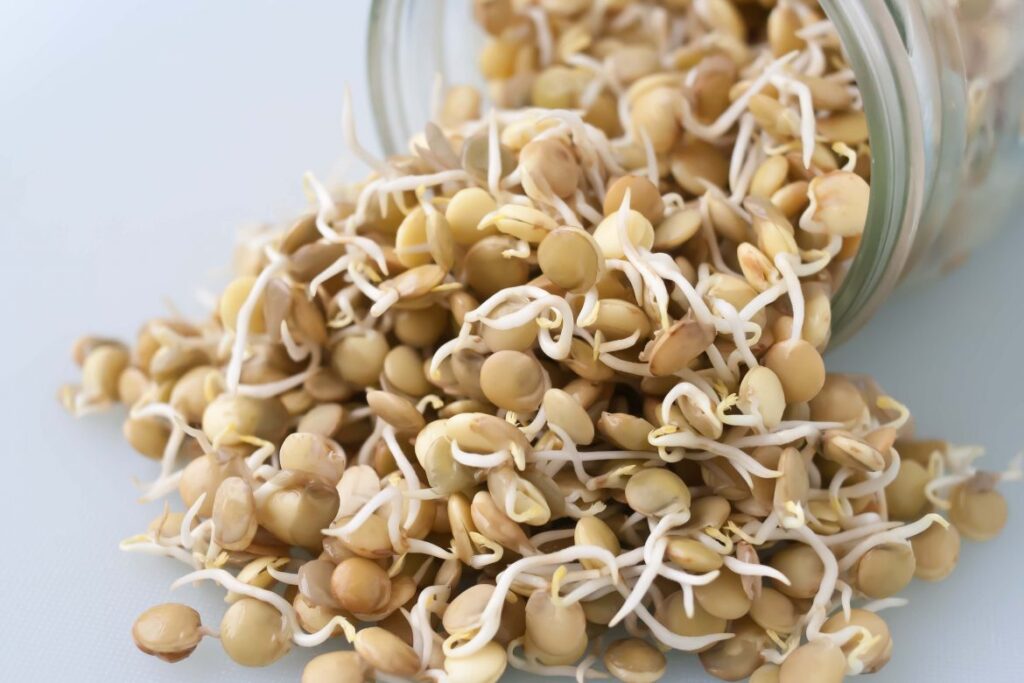
But it is better to remember all legumes, as they are digested severely and for a long time. It is a heavy food for the dog.
Dogs are OK eating almost all fruits and vegetables. But there are some minor exceptions:
- Potatoes – only raw and as a treat
- Cherries are laxative.
- Zucchini, cabbage, farts.
- Sorrel – dangerous for dogs, causes gastritis, and can be fatal
Water for the dog
Water quality requirements for dogs are the same as for humans. The only thing is, don’t constantly give your puppy boiled water, as it can hurt his teeth. And teach your sheepdog not to drink from puddles or ponds, as he can easily pick up a disease.
What foods should not be given to any dog
- Unfresh, substandard
- Industrial (we feed “straight” food, after all)
- Food from your table
- Scorching food and food straight from the refrigerator
- Poor quality water
- Overcooked cereal
- Boiled potatoes
- Tubular bones
- Pork
- Sweets
Video: What not to give a puppy
Frequency of feeding a German Shepherd puppy
- Up to 1.5 months – 6 times a day
- From 1.5 to 3 months – 3-4 times
- 3-6 months – 2-3 times
- From 6 months – 2 times a day
Train your dog to avoid skipping snacks or feedings at night.
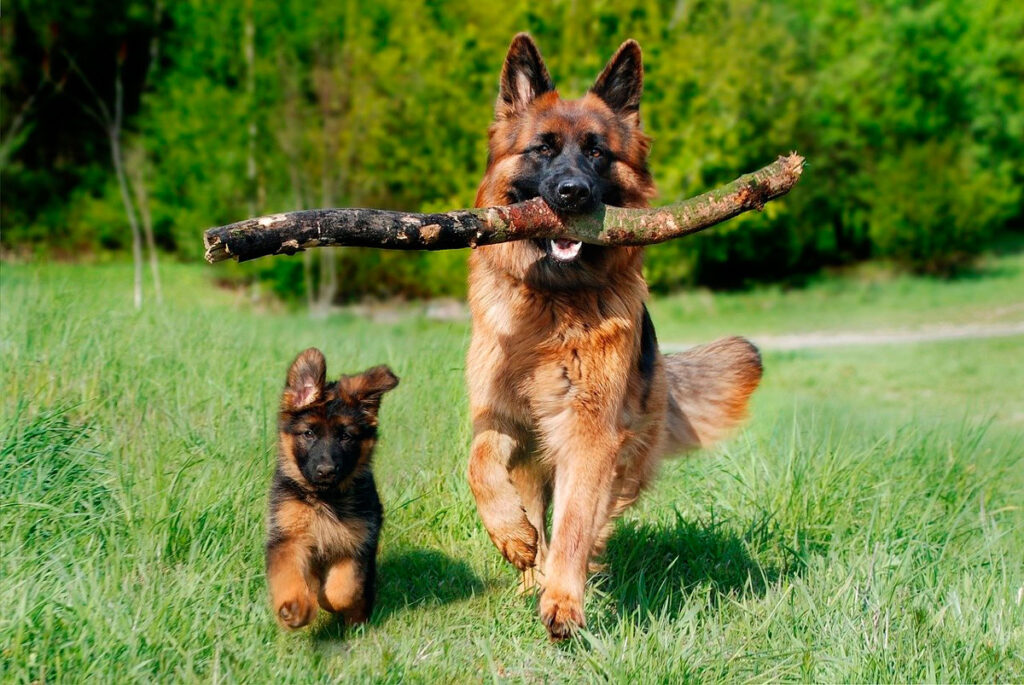
The result of your efforts will be a beautiful and healthy dog!




